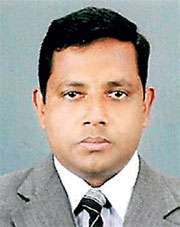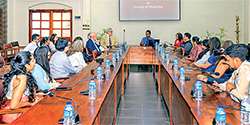Is “Stress” of the executive officers in the university system an obstacle to achieving the goals of Sri Lanka National Universities?
 “Work-related Stress” can be described as a physiological and psychological reaction to the harmful aspects in the workplace. It is recognised as a major challenge worldwide to health and well-being of workers in their organisations. Workers who are constantly under stress seem to be unhealthy, dissatisfied with their jobs, have high negligence, poor motivation and less confidence in their work. Evidence in recent studies suggests that the working in the educational sector is taxing. However, in South Asian countries, such as Sri Lanka, the prevalence, and the contributing factors of work stress in the academic field are rarely studied.
“Work-related Stress” can be described as a physiological and psychological reaction to the harmful aspects in the workplace. It is recognised as a major challenge worldwide to health and well-being of workers in their organisations. Workers who are constantly under stress seem to be unhealthy, dissatisfied with their jobs, have high negligence, poor motivation and less confidence in their work. Evidence in recent studies suggests that the working in the educational sector is taxing. However, in South Asian countries, such as Sri Lanka, the prevalence, and the contributing factors of work stress in the academic field are rarely studied.
Therefore, research was conducted to find out the relationship between organisational stress and job performance of the executive officers in the context of Sri Lankan national universities. The research sample comprised of randomly selected administrative as well as other executive and senior officers who are working in the national universities of Sri Lanka. A national university is typically a state-funded university, but it also refers to a country’s autonomous institution that functions as a completely independent body in the country. In Sri Lanka, 17 state universities are administered directly by the University Grants Commission, which handles funding and appointments.

The University of Colombo, the University of Peradeniya, the University of Kelaniya, the University of Sri Jayewardenepura, the University of Moratuwa, the University of Ruhuna, The Open University of Sri Lanka are the most prominent universities. In order to handle routine tasks and provide instructional management, universities in Sri Lanka employ financial and administrative (executive) staff. They consist of officers at junior, middle and senior levels. Executive officers are responsible for the planning, organisation, management and controlling university operations. Furthermore, they are concerned with university development and growth, service reliability, maintaining goodwill and prestige of the university, student satisfaction, employee satisfaction, commitment, work involvement and productivity.
Given these responsibilities, being an executive officer in the university setup is one of the most stressful jobs in Sri Lanka. Currently, executive resignations and dismissals seem to be more common in the media. This indicates the high expectations and stress associated with the workload and responsibilities of these officers. While maintaining intellectual credibility, an executive officer must also be a leader, instructor, motivator, fundraiser, negotiator, crisis first-aider and social media expert. As a result, work-related stress in this position seems to be high and thus it should be thoroughly investigated. In this research, organisational stress was measured under three variables, namely task demands-related factors, role demands-related factors, and interpersonal demands-related factors.
Task demands related factors are the feeling of not being able to understand where a job will lead an employee or whether his or her activities and tasks will change. Role demands-related factors are stress factors related to the role that an individual is likely to perform within their workplace. Finally, interpersonal demandsrelated factors are stressors involved in peer pressure, management conflicts, and personality conflicts. According to the framework of this study, it primarily focuses on analysing the effect of organisational stress on employees’ job performance at executive level.
The sample population in this study included 631 administrative and other senior executives from national universities in Sri Lanka. A thoroughly designed online Google form questionnaire was shared with the sample to gather information and 240 participants responded to the survey. “SPSS version 25” statistical software was used to analyse the data. According to the findings of this research, job stress in terms of taskdemand and role-demand related factors had a significant negative relationship to job performance. This suggests that when stress occurs, it has a significant impact on performance and that stress reduction can improve the performance.
As a result, the two are inversely related to each other. Interpersonal demands-related stressors, on the other hand, had no significant effect on job performance. Based on the results of this research, few recommendations can be provided, which can be beneficial for the policy makers. To begin with, executive officers at national universities should be introduced to an induction process as well as a number of other stress reduction programmes to raise their awareness and improve their skills and knowledge in recognising, utilising, and managing stress.
It would be beneficial if, an advisory department can be established to instruct the individual officers to successfully manage organisational stress. Secondly, the university administration can design and develop regular work-life balance programmes, such as sports activities and family days to minimise the intrusion of work pressure on employees’ personal and family life. Finally, through this research, it can also be recommended that effective communication techniques will be helpful in reducing stress within workplace and influencing job performance towards achieving set goals and objectives.
K.G. Dhammika B. Katupulla
Senior Assistant Bursar,
The Open University of Sri Lanka,
Kandy Regional Centre -Polgolla









































.jpg)
.jpg)

.jpg)
.jpg)
.jpg)
